Henry Neville (died 1615) facts for kids
Quick facts for kids
Sir Henry Neville
|
|
|---|---|
 |
|
| Baptised | 20 May 1564 |
| Died | 10 July 1615 (aged 51–52) |
| Spouse(s) | Anne Killigrew |
| Children | 12 |
| Parent(s) | Henry Neville, Elizabeth Gresham |
Sir Henry Neville (born 20 May 1564 – died 10 July 1615) was an important English person who worked for the royal court, in politics, and as a diplomat. He is well-known for being the ambassador to France. He also tried to help the King and Parliament get along, but it was a tough job. In 2005, some people even suggested that he might have secretly written Shakespeare's famous plays!
Contents
Early Life and Family
Henry Neville was born on May 20, 1564. His father was also named Henry Neville, and his mother was Elizabeth Gresham. His mother's family included Sir Richard Gresham, who was a Lord Mayor of London.
Henry Neville grew up at Billingbear House in Berkshire, England. When he was about 15 years old, he went to Merton College, Oxford, a famous university. His teacher there was Henry Savile. In 1578, Henry Neville traveled with his teacher around Europe, visiting cities like Padua, Venice, and Prague.
A Career in Public Service
Henry Neville was very active in public life. He was elected to Parliament several times, representing different areas like New Windsor and Berkshire. As a MP, he helped make laws and discuss important issues for the country.
In 1595, he became the High Sheriff of Berkshire, which meant he was the chief law enforcement officer in his county. Before his father passed away, Henry Neville lived at a place called the Archbishop's Palace in Mayfield, Sussex. There, he ran a very successful business that made cannons! This was a big deal back then.
In 1596, he became a Deputy Lieutenant for Berkshire, helping to organize the local military. He was given the title of Sir in 1599, which showed he was highly respected.
Ambassador to France
In 1599, Sir Henry Neville was chosen to be the Ambassador to France. This meant he represented England and its Queen, Queen Elizabeth I, at the court of King Henri IV of France. Even though he was knighted for his work there, he wasn't happy with how he was treated. In 1600, he asked to come back to England, saying he had trouble hearing.
Challenges and Later Years
After returning home, Sir Henry Neville faced some difficulties. He became involved in a situation in 1601 that led to him being held in the Tower of London. His close friend, Henry Wriothesley, 3rd Earl of Southampton, was also held there at the same time.
Sir Henry Neville lost his position and had to pay a large fine of £5,000. He agreed to pay it off over several years. However, when Queen Elizabeth I died and King James I became the new king, a special order was given for his release.
After he was freed, Sir Henry Neville became even more involved in the political life of England. He often gave advice to King James I, suggesting that the King should listen more to the requests of the House of Commons (the elected part of Parliament). This advice didn't always make the King happy.
Because of his strong opinions and advice, he missed out on becoming the Secretary of State in 1612, which was a very important job. He was offered another job, Treasurer of the Chamber, but he turned it down.
Sir Henry Neville passed away in 1615 and was buried at St Lawrence church in Waltham St Lawrence.
Shakespeare Authorship Idea
In 2005, some people started to suggest that Sir Henry Neville might have been the real writer of Shakespeare's famous plays and poems. This idea is called the "Nevillean theory." However, most experts who study Shakespeare do not agree with this claim.
Marriage and Children
In December 1584, Sir Henry Neville married Anne Killigrew. Together, they had a large family with five sons and six daughters. Some of their children included:
- Henry Neville (II)
- Catherine Neville
- Frances Neville
- Mary Neville
- William Neville
- Edward Neville
- Robert Neville
- Dorothy Neville
- Charles Neville
- Richard Neville
- Elizabeth Neville
- Anne Neville
 | Bessie Coleman |
 | Spann Watson |
 | Jill E. Brown |
 | Sherman W. White |


